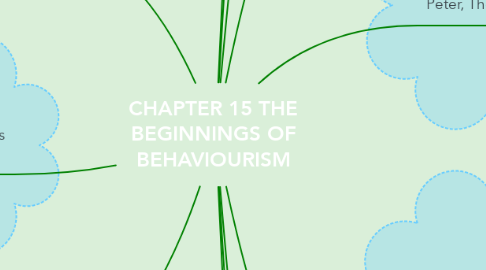
1. Peter, The Opposite of Albert
1.1. The Experiment
1.1.1. modelling
1.1.1.1. show other child fearlessly with presented of rabbit
1.1.2. Counterconditioning
1.1.2.1. eat lunch,move rabbit to Peter everyday
1.1.3. Generalisation
1.1.3.1. Peter’s other fears also eliminated
1.2. fear rabbit,frog,fish etc
2. THE SUBJECT MATTER OF BEHAVIOURISM
2.1. Four Types of Behaviour
2.1.1. explicit learned behavior
2.1.1.1. talking, writing
2.1.2. implicit learned behavior
2.1.3. explicit unlearned behavior
2.1.3.1. grasping, blinking
2.1.4. implicit unlearned behavior
2.1.4.1. glandular secretions
3. OBJECTIVES
3.1. Learn about Watson's behaviourism
3.2. Criticisms and contributions
4. JOHN BROADUS WATSON
4.1. The Development of Behaviourism
4.1.1. practical value
4.2. Watson' psychology
4.2.1. Psychology = science of behaviour
4.2.2. Discard mentalistic ideas
4.2.3. experimental natural science
4.2.4. behaviour concepts
4.2.5. Goal, prediction and control of behaviour
5. The Methods of Behaviourism
5.1. Observation
5.1.1. With and without the use of instruments
5.2. Testing methods
5.2.1. Test results = samples of behaviour
5.3. Verbal report method
5.3.1. Speech reactions are meaningful
5.4. Conditioned reflex method
5.4.1. objective method of analysing behaviour
5.5. Role Change
5.5.1. focus on objective methods
5.5.2. Elimination of introspection
5.6. Compare
5.6.1. Wundt & Titchener
5.6.1.1. Subjects were both observer and observe
5.6.1.2. Role more important than experimenter
5.6.2. Behaviourism
5.6.2.1. Observed by experimenters
5.6.2.2. No longer actively observed their own characteristics
5.6.2.3. Merely behaved
6. Examples of Watson’s Work
6.1. WWI
6.1.1. US army
6.1.1.1. motor ability test used for pilots
6.1.1.2. research on reduce oxygen at high altitude
6.2. After 1920
6.2.1. academic psychology
6.2.2. Presented behavioural psychology to public
6.3. Watson’s Business Career
6.3.1. Applied psychologist in advertising
6.3.2. Human behaviour is not machines
6.3.3. laboratory studies of consumer behaviour
6.3.4. Advertising messages
6.4. Child-Rearing Practices
6.4.1. regulatory system
6.4.2. Transformed American child rearing practices
6.5. Learning
6.5.1. contiguity and frequency
6.5.2. learning situation
6.5.3. trial end with animal making the correct response
6.6. Instincts
6.6.1. training, learned behaviour
6.6.2. Heritable differences influence personality characteristics
7. Little Albert
7.1. The Experiment
7.1.1. Before conditioning
7.1.1.1. white rat= no fear(NS)
7.1.1.2. loud noise= fear (US)
7.1.1.3. cry (UR)
7.1.2. During conditioning
7.1.2.1. presented white rat and loud noise several times to produce fearful response
7.1.3. After conditioning
7.1.3.1. rat (CS)
7.1.3.2. fear (CR)
8. Criticisms of Watson’s Behaviourism
8.1. applied psychology
8.2. published books,articles
8.3. members of the intelligentsia opposed Watson
8.3.1. Early critic of Watson was fellow psychologist, William McDougall
9. Contributions of Watson’s Behaviourism
9.1. psychology more objective in methods and terminology
9.2. Served as something to protest against
9.3. Provide a strong conceptual base for modern psychology
10. NEXT CHAPTER
10.1. Behaviourism: After the Founding
11. William McDougall
11.1. psychology as a science of behaviour
11.2. study events by observing their influence on behaviour
11.3. Wrote book
11.3.1. introspection and free will in psychology
11.4. criticised Watson's form of Behaviourism
11.5. The Watson-McDougall Debate
11.5.1. Data of behaviour = proper focus for psychological research
11.5.2. disagree with Data of consciousness = indispensable
12. American Psychology (20th century)
12.1. William James & G. Stanley Hall
12.1.1. Alive and influential
12.2. Titchener
12.2.1. Structuralism @ Cornell
12.3. Chicago & Columbia
12.3.1. Functionalists were opposed to Structuralism
12.4. Animal research
12.4.1. more prominent
